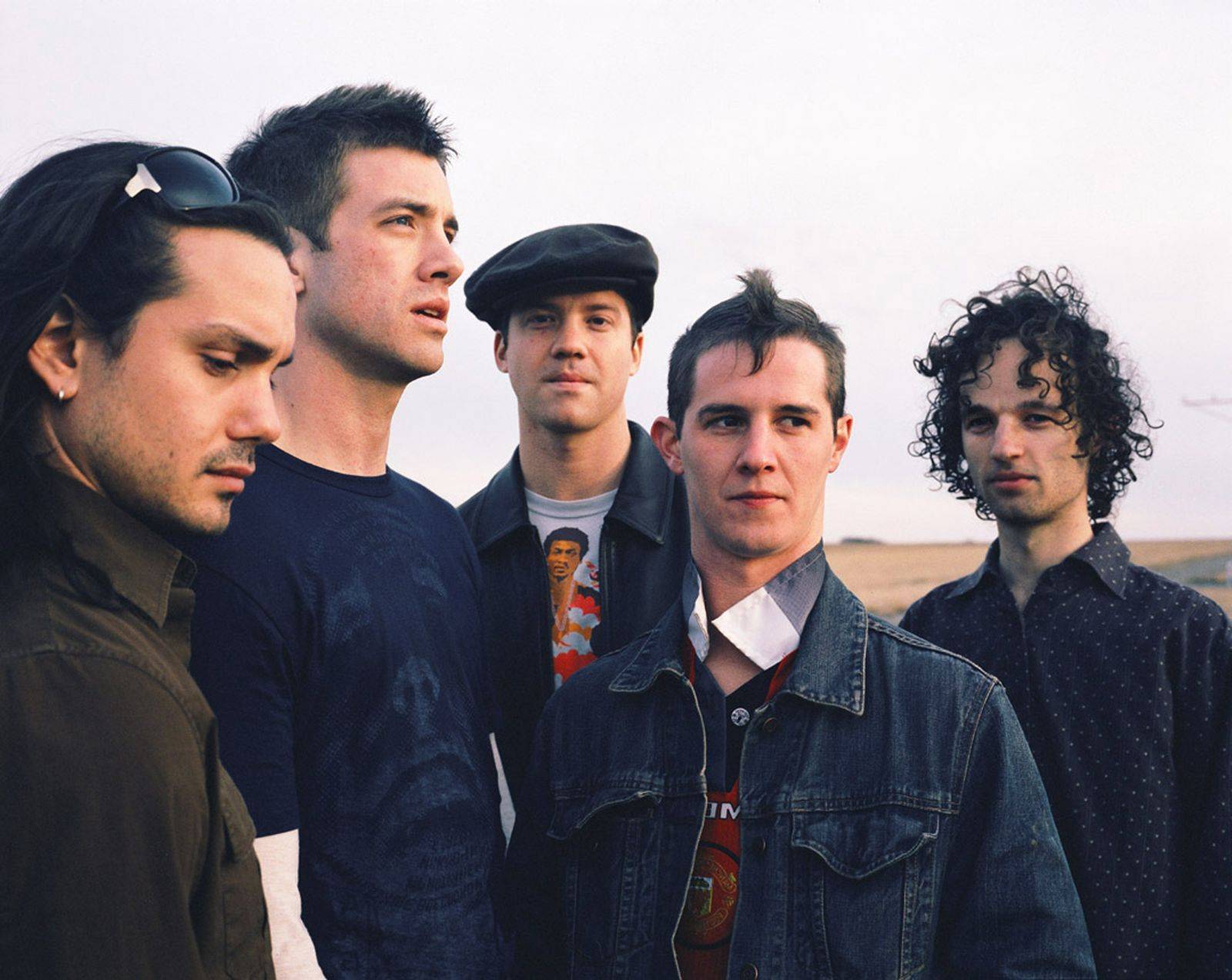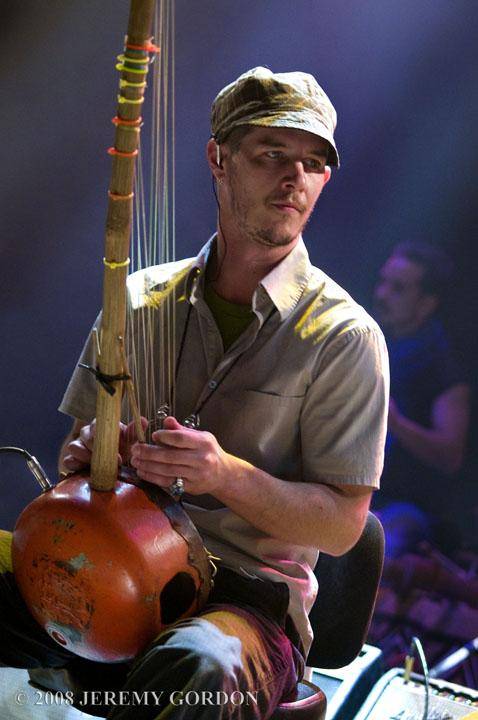The Police were often credited with bringing “world music” to the rock and roll masses. The band’s trio of mysteriously titled debut records — 1978’s Outlandos d’Amour, 1979’s Regatta de Blanc, and 1980’s Zenyatta Mondatta — smudged the line between black and white music. While The Police incorporated reggae as an obvious influence, they also flavored their songs with the obtuse stylings of jazz, the studio trickery of dub, and the dark mood and expressive rhythms of African music. Thirty years later, few Caucasian bands have attempted, let alone mastered, such a stunning synthesis of black musical forms in the context of creating music for generally white audiences. Toubab Krewe (pronounced “two-bob crew”), who performs tonight, Feb. 20, at the Cowboy Monkey, hopes to change that.
 The instrumental quintet has its roots in the thriving arts scene in Asheville, North Carolina. Tucked away near the edge of the Appalachian mountain range and the state’s western border, far from the famed Research Triangle that comprises Duke University, the University of North Carolina, and North Carolina State University, Asheville is a vibrant city roughly the size of Champaign. It is largely unknown on the national level, save for being home to George Vanderbilt’s sprawling Biltmore Estate. The city, however, has bred its own significant artists’ colony, perhaps in part the remnants of the avant-garde culture that permeated nearby Black Mountain College in the mid-twentieth century. The short-lived, progressive school was home to teachers John Cage and Buckminster Fuller, guest lecturers Albert Einstein and William Carlos Williams, and pupils Robert Creeley and Robert Rauschenberg.
The instrumental quintet has its roots in the thriving arts scene in Asheville, North Carolina. Tucked away near the edge of the Appalachian mountain range and the state’s western border, far from the famed Research Triangle that comprises Duke University, the University of North Carolina, and North Carolina State University, Asheville is a vibrant city roughly the size of Champaign. It is largely unknown on the national level, save for being home to George Vanderbilt’s sprawling Biltmore Estate. The city, however, has bred its own significant artists’ colony, perhaps in part the remnants of the avant-garde culture that permeated nearby Black Mountain College in the mid-twentieth century. The short-lived, progressive school was home to teachers John Cage and Buckminster Fuller, guest lecturers Albert Einstein and William Carlos Williams, and pupils Robert Creeley and Robert Rauschenberg.
Asheville’s downtown district features an array of boutiques and ethnic restaurants, and on certain summer nights a throng of townspeople descend on downtown to enjoy the city’s musical heritage in the form of a massive drum circle. When I visited the town three summers ago, I was taken aback by the sheer number of participants in the drum circle — at least 25 — and the size of the crowd that had gathered to watch — more than a hundred.
“We believe we were part of a swell in the appreciation of the international arts in town,” Toubab Krewe told me via e-mail, choosing to answer my questions as one voice. “Every night of the week in Asheville you can find a Samba, Salsa, West African, or Haitian dance class. There is a large traditional music, southern Appalachian old-time music, Celtic, and bluegrass community of artists in Asheville — and a growing visual arts and crafts scene. It is an open-minded city, a traveler’s destination, and internationally conscious. Asheville is a good place to be in the creative arts.”
Toubab Krewe drummer Teal Brown and guitarists Justin Perkins and Drew Heller recall attending their first drum circles in Asheville some twenty years ago, when Brown’s father was a participant. Growing up in such a communal, spirited environment aided in the formation of the group’s musical foundation, and contributed to the lack of boundaries it places on its musical parameters. So did the band’s travels abroad.
“We have been going back and forth to Guinea, Ivory Coast, and Mali since 1999. First as friends, second as students of music, and now as a band, we have embraced [their culture] as well as been embraced,” says the group. “It lit the torch to search out new music and opened our ears to the rest of the world. Our travels ignited the possibility of going beyond what we thought was musically possible. Ultimately, by finding a sense of place and beauty in a foreign land, we have discovered the similarities of roots music here at home.”
 Toubab Krewe’s “roots music” (click above to listen to a song from their self-titled debut album) is a thick stew of American influences — from swampy rock and roll to Crescent City R&B — seasoned heavily with authentic interpretations of West African traditional music. A bulk of the band’s songs are directly inspired by African ethnic music, and have been reworked to incorporate the group’s own personality. On stage, one can expect to see a drum kit and electric guitars mixed with myriad instruments indigenous to West Africa: the kora (a 21-stringed harp), the ngoni (a plucked lute), and various percussive instruments, including the karinye (a metal scraper) and djembe. West African music favors subtlety over lengthy solos, and to a large degree Toubab Krewe remains true to that style. Hypnotic, repetitive passages build a shadowy, affecting mood, then shift gradually to reveal new voices. Melody is always buffered by significant percussion.
Toubab Krewe’s “roots music” (click above to listen to a song from their self-titled debut album) is a thick stew of American influences — from swampy rock and roll to Crescent City R&B — seasoned heavily with authentic interpretations of West African traditional music. A bulk of the band’s songs are directly inspired by African ethnic music, and have been reworked to incorporate the group’s own personality. On stage, one can expect to see a drum kit and electric guitars mixed with myriad instruments indigenous to West Africa: the kora (a 21-stringed harp), the ngoni (a plucked lute), and various percussive instruments, including the karinye (a metal scraper) and djembe. West African music favors subtlety over lengthy solos, and to a large degree Toubab Krewe remains true to that style. Hypnotic, repetitive passages build a shadowy, affecting mood, then shift gradually to reveal new voices. Melody is always buffered by significant percussion.
“There is an aesthetic of other-worldyness [in West African music] … getting out of your mind,” the band says. “The music takes you to a rooted, yet higher place.”
African music is experiencing a critical renaissance in the States. The Ethiopiques compilation series, along with the Jim Jarmusch film Broken Flowers, helped to break Ethiopian jazz pioneer Mulatu Astatke in America. Other recent compilations focusing on the influence of American musical forms on Nigerian music, such as the Nigeria 70 and Nigeria Rock Special collections, have drawn rave reviews. The North African desert blues of Tinariwen, dubbed “the music of the unemployed,” made many critics’ Best of 2007 lists. And the relatively recent reissuing of a bulk of Fela Kuti’s catalogue has brought his politically-charged Afro-beat to the masses. Couple this acceptance of African-centric performers with the rise of American bands who have adapted in large part (Budos Band) or small part (Vampire Weekend) the influences of African music, and you have a groundswell of support for a quintet of youthful white musicians from the South who are more than dabbling in the culture and music of a disparate region of the world.
Listening to Toubab Krewe discuss how they fit in to the larger critical picture, I hear the band’s hippie ideals run wild. They speak of a fluidness to the world at large, and feel that their willingness to embrace new cultures rather than partition themselves from all things foreign will increase their relevance in a claustrophobic musical climate. Such thinking is evident when I ask the band about their feelings for the term “world music,” which can often be a death knell when assigned to those seeking hipness.
“It is a Western term for defining music outside of its domain,” Toubab Krewe relates. “It’s Western-centric. … We think it’s possibly politically correct to a fault, just limiting in nature — a separation is created by defining something by what it is not. Born of good intentions, but maybe outdated. …
“The irony of it is there are bands that have been excluded from ‘world music festivals’ for having ‘American influences.’ ”
It is unclear whether the band is referencing itself. But Toubab Krewe has had success on the festival circuit, performing at large-scale affairs like Bonnaroo in the States and Mali’s Festival of the Desert. Toubab Krewe’s performance at the latter festival, which combines a focus on the music and culture of the Touaregs, nomads from the south Sahara, with that of outsiders, was a high spot for the group. The concept of the festival is based on the long-established annual meeting of nomads, in which groups would reconnect with each other following a long season of travel, celebrate life, resolve conflicts, and exchange solutions to the challenges facing each group. Such a gathering seems congruent with the collective, “we are the world” nature of Toubab Krewe.
“ ‘Toubab’ is a Bambara word meaning ‘non-African’ or ‘foreigner,’ ” the group explains.
“I guess we associated with the term while we were [visiting West Africa]. We didn’t experience it being used in a derogative manner. It was just kind of the way it was … we were foreigners, and [their] language, culture, and music were very different from what we had known.
“But, we have formed such great relationships, and found a real sense of place in West Africa, that ‘toubab’ has taken on some new meaning. Being ‘toubab’ is a chance for growth, an opportunity to find common ground amongst differences. We are all foreigners someplace, but we have all found a sense of place somewhere we may have least expected it. That’s life.”
——
Toubab Krewe performed last year as part of the Krannert Center’s Wall2Wall Guitar Festival. They performs tonight, Feb. 20, at the Cowboy Monkey with opener, local Zimbabwe-influenced group Mhondoro Rhythm Success. Read more about the opening act’s guest percussionist, Bolokada Conde, later today on Smile Politely. Show starts at 9:30 p.m. and tickets are $10.








